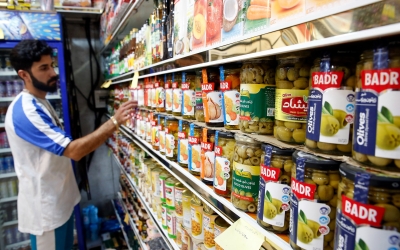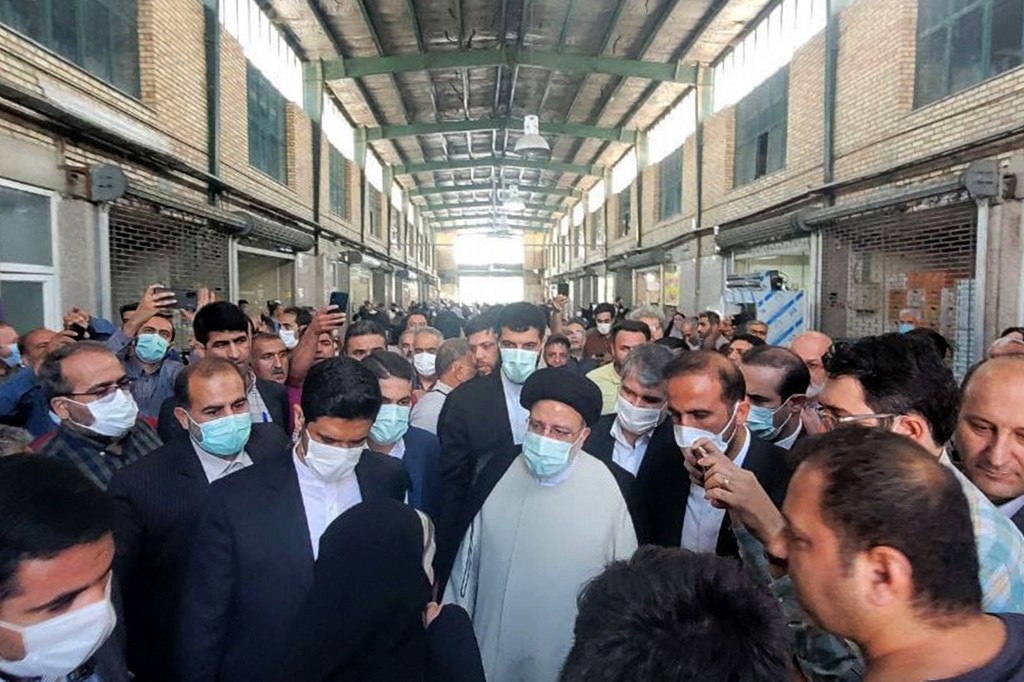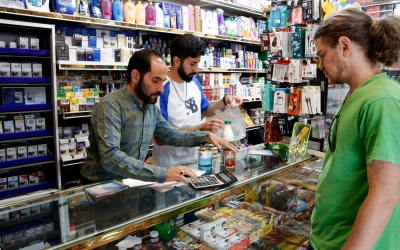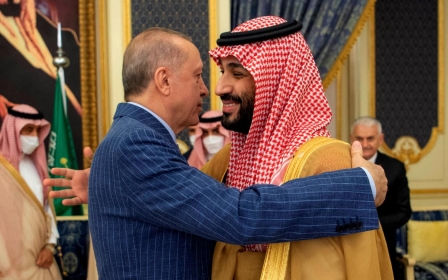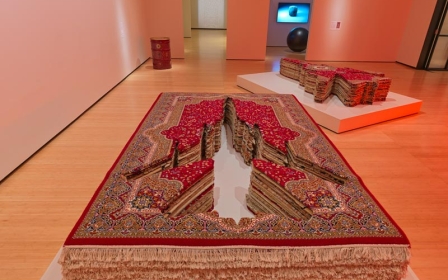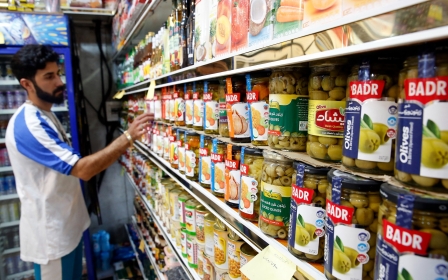Protests, strikes, internet cuts: Iran rocked by unrest as food prices soar
Iran has been rocked by protests in recent weeks against an economic crisis exacerbated by subsidy cuts that saw the prices of basic goods soar.
According to unofficial sources and information published on social networks, at least five people have been killed so far in the nationwide protests as anti-riot police have been deployed across the country to quell unrest.
Meanwhile, the Iranian government has cut off the internet in a number of areas and cities that have witnessed protests, including Khuzestan province.
Last month, Iran's hardline government, led by the newly elected President Ebrahim Raisi, declared that it had decided to cut and end subsidies for wheat and flour, calling it necessary "economic surgery".
This has led to unprecedented price rises of as much as 300 percent for a variety of flour-based staples in a country where almost half of the 85 million population lives under the poverty line.
The government argues that the price increases are because of the global wheat crisis sparked by the Russian invasion of Ukraine. Both countries are among the biggest producers and exporters of wheat and corn, as well as cooking oil.
According to the government's official website, Raisi's administration had to cut wheat and flour subsidies because many middlemen were buying subsidised flour from local industrial businesses with a surplus to smuggle abroad and make a huge profit.
For more than two weeks, thousands of people have taken part in protests mostly in western areas, including Khuzestan and Chaharmahal Bakhtiari provinces, and the cities of Boroujerd in Lorestan province, and Dehdasht in Kohgiluyeh and Boyer-Ahmad province.
Some rallies have also been reported in a number of cities in the central province of Esfahan and the eastern province of Khorasan Razavi. But the focal points of clashes and protests have been in the cities of Izeh, Dezful and Andimeshk in Khuzestan province.
'These protests are driven by economic hardship rather than political opposition. The protesters are hungry'
- Iranian sociologist
Protesters chanted "Raisi should be ashamed and leave the country alone," "the clerics must get lost," "no progress, no recreation, our youth was wasted," and "down with rising prices".
Analysts who spoke with Middle East Eye said the protests were an inevitable outcome of a crisis that has particularly hit the poor.
"People living in Tehran and big cities are still able to stand the new economic hardships, but in the villages and small towns there is no way to earn more money to overcome the new difficulties," an Iranian sociologist told MEE on condition of anonymity for fear of reprisals.
"So people have no way except to rise up because they do not have enough income or savings. These protests are driven by economic hardship rather than political opposition. The protesters are hungry."
Raisi, in an apparent reaction to the protests, stated on 14 May that "people acted very vigilantly, ignoring the anti-revolutionary [goals]".
An Iranian economics professor said slashing subsidies would naturally result in price shocks and therefore revolt.
"Economic reform and cutting subsidies must take place at the right time. Many countries that cut subsidies have overall better conditions, including the fact that they have no political tensions and no sanctions imposed on them, unlike Iran," he said.
In Tehran, the capital, municipality bus drivers went on strike on 15 May demanding a 57 percent increase in salaries. The strike continued for a few days.
The drivers also staged protests against the hardline mayor of Tehran, Alireza Zakani, chanting "incompetent mayor, resign, resign". Zakani has so far turned down their demand and some drivers were detained.
The semi-official ISNA news agency reported that, following the strike in Tehran, 700 buses run by Tehran's police are providing free transport services.
Celebrities show solidarity
In recent days, concurrent with rising dissatisfaction with the economic situation, Iranian celebrities have voiced support for the protests.
"In such circumstances, we should not celebrate when people's morale is not good," Ali Nasirian, a renowned actor, stated during an actors' ceremony last week.
Another actor, Parviz Parastoui, wrote an open letter to Supreme Leader Ayatollah Ali Khamenei on his Instagram account, saying: "It is not right that our people face shooting and tear gas in the streets.
"People do not have money, they cannot afford [to purchase] chicken, pasta, and cooking oil... they are ashamed of [facing] their wives and children. People's right place is not prison."
Parastoui later deleted the post.
Iranian director and two-time Oscar winner Asghar Farhadi said in a press conference of the jury of the 75th Cannes Film Festival: "Deep inside, I'm not happy over being a juror at Cannes this year because like many Iranians I can't be really happy. People are fed up, and nothing will make the people of Iran happy right now."
Shahab Hosseini, a popular actor and a winner of the best actor award at the Cannes Film Festival, also threw his weight behind protesters, saying that "as poverty enters people's homes, faith leaves".
Meanwhile, the most controversial reaction came from Voria Ghafouri, the captain of the popular Esteghlal football team. "When it comes to social and civil issues, football is no longer my priority, and I must take advantage of my position and be the voice of [people]", said Ghafouri.
"Aren't the authorities ashamed of this situation? I hope our people live the life they deserve. Our life is short, and it is the right of the Iranian people to live happily," he told reporters after Esteghlal's match on 14 May.
In response, Iran's state TV has reportedly banned its channels from interviewing Ghafouri or showing his picture.
The attacks on the popular player led prominent Iranian football player Ali Daei to speak out in support of Ghafouri. He slammed the hardliners for "silencing the critics," saying earlier this week: "People are experiencing the worst economic situation, so instead of a crackdown, you should fundamentally think about solving their problems."
'Fire under the ashes'
An Iranian journalist who spoke with MEE on condition of anonymity for fear of repression said the economic crisis in the country is rooted in both the US sanctions and the mismanagement of the situation by government officials.
"People are no longer able or willing to tolerate economic hardships for the sake of our officials' ideology. That's why the people do not support the new economic plan of Raisi, as they see simultaneously the budget of seminaries and other useless institutions rising. They ask why should we go under economic surgery, but not the officials themselves?"
The sociologist who also preferred not to disclose his name warned that failing to address the protesters' demands could lead to an "explosion".
"If we do not listen to the loud voice of the people now, and think that we can end these protests by imprisoning and detaining a few people, I must say that this is fire under the ashes and [it] will be ignited in another place and situation, because when a society reaches the phase of the explosion, no one will be able to control it.
"All the revolutions in the world have occurred in a context when no one listened to the people," he said.
This article is available in French on Middle East Eye French edition.
Middle East Eye delivers independent and unrivalled coverage and analysis of the Middle East, North Africa and beyond. To learn more about republishing this content and the associated fees, please fill out this form. More about MEE can be found here.


